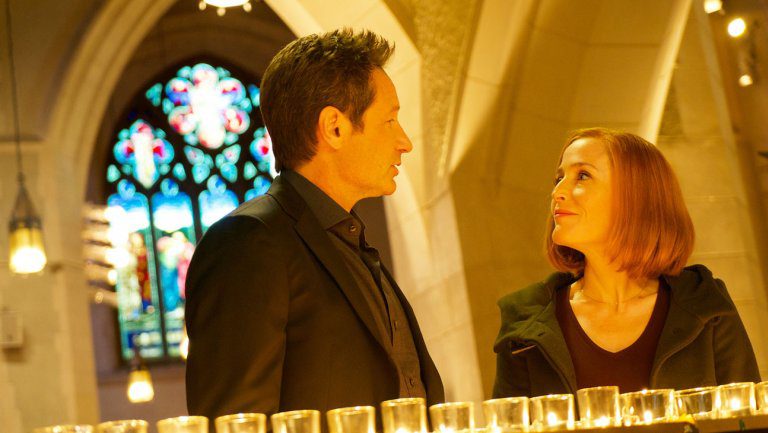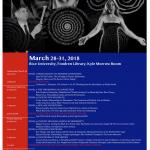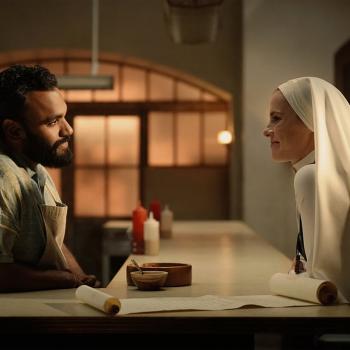The episode starts with doctors harvesting organs. We hear a snippet of talk radio about chemtrails, and then get to see a vampire hunter, who uses biblical and other Christian religious language, praying for mercy and crossing herself.
In the Cathedral of the Sacraments in Washington DC, a priest speaks of eating the flesh and drinking the blood of Christ, reading from John 6. Scully is attending the service when she gets a phone call. Mulder and Scully go to investigate, and Mulder takes some delight in getting local law enforcement to leave by feigning surprise that the killer didn’t use a wooden cross made from the three types of wood that Jesus’ cross is supposed to have been made from.
Later in church, Juliet (the vampire hunter) responds to her priest, when he says that he will pray for her sister’s return, that prayer isn’t enough. In a pew in the same church, Scully talks about praying for her brother’s recovery from illness while a child, and then praying for a puppy and believing it was a miracle when her family got one. Mulder says that he now knows why he isn’t a Christian – his parents never got him a puppy! Scully goes on to talk about the power of faith.
Juliet’s sister Olivia, we learn, hated the way she looked, and left home to join a cult. That cult, far from being typical supernatural vampires, are rather a group led by two individuals who maintain their youth by devouring harvested organs, drinking blood, and even having themselves surgically attached to a younger cult member.
Dr. Luvenis, whose ideas are behind the cult’s practices, asks Mulder if he has ever asked what could be accomplished if we were free from government restraints. He says that he has discovered a cure for the disease of aging.
 Juliet says that she is fine with accepting the consequences of her actions and going to prison, giving up her lifetime on earth for an eternity in heaven. This highlights the contrast between the extreme to which questing after prolonging youth in this life can go, and the liberating power of the hope of rewards in an afterlife (in some circumstances at least) to enable one to sacrifice in this life for a greater good.
Juliet says that she is fine with accepting the consequences of her actions and going to prison, giving up her lifetime on earth for an eternity in heaven. This highlights the contrast between the extreme to which questing after prolonging youth in this life can go, and the liberating power of the hope of rewards in an afterlife (in some circumstances at least) to enable one to sacrifice in this life for a greater good.
The religious imagery in vampire stories is always interesting (even when not focused on vampires in the classic sense, as in the case of this episode). What makes Catholicism such a focus in that tradition? At the end of the episode, Mulder lights a candle in church alongside Scully. Their honest conversation about God is really striking at the end of an episode that was so hard to take seriously. So too is Mulder’s articulation of reason and faith in harmony as the reason that he and Scully are so good together.
Also particularly interesting in this episode is the move away from supernatural to natural on the one hand – it is human doctors and TV stars obsessed with beauty that one might need to fear, rather than the stereotypical undead – while on the other hand, the approach is so exaggerated that (for the most part at least) nothing about it is genuinely terrifying, but merely gruesome and disgusting. Some of the campiness, however, is not just a nod to a particular brand of horror film, but connects directly to a central theme of the episode. The actress Barbara Beaumont has managed to retain her youth through these horrific means. But to what end? Youth and beauty have become and end in themselves, and this is highlighted when we see her rewatching her old TV shows or performing a 1973 hit while commenting on her earlier performance of it on the Sonny and Cher Show. Her creepy rendition of “There Has To Be A Morning After” makes much more sense when we pick up on this symbolism. The opening words – “I Want To Be Beautiful” instead of the standard “I Want To Believe” – highlight this, as well as connecting with another key point. The cult members do what they do, giving their lives of their own free will. But how free are our wills, really, when we are surrounded by media images that offer a particular standard of beauty and make us ashamed of who we are?
The fact that the classic mad scientist playing God also highlights the positive role of government oversight is an interesting move for The X-Files, which throughout its history has focused so much on the untrustworthiness of government.
The episode ends with a close-up of a candle in church, and choir singing Amen. The episode’s beginning and ending are religious in focus and that remains true throughout. What an unusual but very interesting episode of The X-Files! What did you make of it? And what do you imagine that Scully whispered to Mulder towards the end of the episode?













